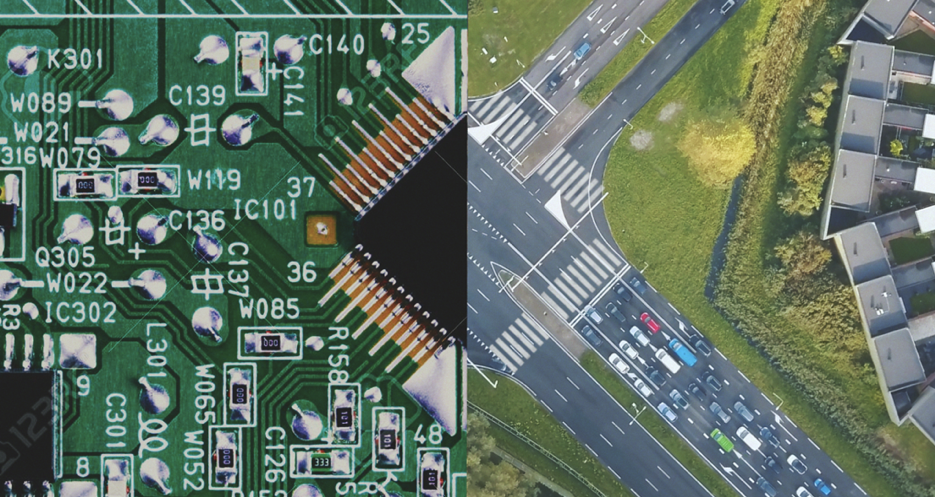New technologies are changing our cities
The technological innovations of the past few years clearly show that digitization is advancing rapidly. Mieke De Ketelaere predicts that 5 new technologies will be key in the coming years.
"I think Artificial Intelligence (AI) will develop even faster than what we’ve seen so far," she says. "But conversational platforms - like chatbots and assistants - will be used more and more as well. Not to mention the Internet of Things or Digital Twins, a dynamic software model of an existing or non-existing physical object or system. We humans could get a digital variant - a digital clone that takes over a large part of our work and daily activities. And last but not least, blockchain will become mainstream. This technology is currently in its infancy, but more and more blockchain applications that have little to do with financial transactions will turn up. I expect many initiatives in different industries!”
“All things happening around smart cities have great potential”
“There is indeed considerable potential in our digitization", Bart Preneel agrees. "Just look at everything happening around smart cities. Perhaps you’ve already heard about the big belly, the clever trash can that’s actually a smart waste and recycling system. Such solutions are technology-based, but have a huge social impact. And that's what it’s all about. As long as it all fits together in a clever way.”
A treasure trove of data: what’s the added value?
With “clever”, Bart refers to the privacy-friendly nature of such applications. "There is little point in developing solutions for e.g. mobility - such as car-sharing or pay-as-you-drive - where we collect massive amounts of data, and then handle that data in a sloppy way. If we don’t work properly, we will lose much more data in the future due to leaks and hacks. And that will be at the expense of consumer confidence in new technologies. If self-driving cars are taken over by malicious parties, then people will not be inclined to use them. The attention for the safety and privacy of people must therefore increase. If you see how much attention the incident of Facebook and Cambridge Analytica got, you can consider that as a wake-up call.”

“Digitization indeed entails a treasure trove of data", believes Mieke. "And that big data is the fuel of almost all new tech that we can expect in the near future. But all depends on what is being done with that big data."
"And that’s the problem," adds Bart, "because despite the many possibilities of our digitization, we handle that data in a very sloppy way. And there’s far too much data - big data pollution, so to speak – which results in too much profiling. And of course, not everybody’s happy with that.”
“Big data can only add value under certain conditions”
“Big data can only offer real added value if specific conditions are met", says Mieke. "The most important one probably being the transparency towards citizens and customers. Customers should have the right to decide what happens with their data. And we still have to find a good balance in the way man and machine work together to achieve optimal results. The approach as defined by Human Computation initiatives is certainly a right approach for this”, says Mieke.
Ethical debate is urgent
Theoretically this all sounds very nice. But the big problem is that there’s little to no framing of how to deal with big data. "Unfortunately, there is no regulation regarding the storage time of data," agrees Mieke. “Companies are insufficiently cleaning or degenerating that data. The quality of data stored in data management platforms is often very bad. It speaks for itself that companies using these platforms as their 'central customer data input' often get things wrong in online personalizations etc. Striking examples of that big data pollution Bart talked about.”
“Our research group at imec carefully evaluates the tension between public data and privacy protection", Bart explains. "We’re also trying to develop solutions that reduce that tension."
“We clearly need a new debate about privacy”
"In that sense, we can state that a privacy debate is a necessity," says Mieke. "I’m thinking of a demystifying debate about what is or is not possible. People who are not active in our ICT world clearly need to be more aware. Apart from that, I also share the opinion that it’s up to each individual to decide what can be shared. That freedom is really important. Compare it with building a house: some want a large fence to protect their privacy, others don’t care. Privacy differences exist in the offline world too.
“But it’s important to understand that the data you share as an individual can also be used to profile others,” Bart says. “So, privacy – just like pollution – is also a collective problem.” Enough food for thought!
------------------
10 free tickets to win!
Triggered to learn more about the impact on our society of new technologies and datastreams in the cities of tomorrow? The first 10 people who send a message to kim.indeherberg@sas.com will get a free ticket to join us in Leuven on 3 and 4 May during the and& summit & festival. Check out the full program and the exclusive SAS sofa sessions!